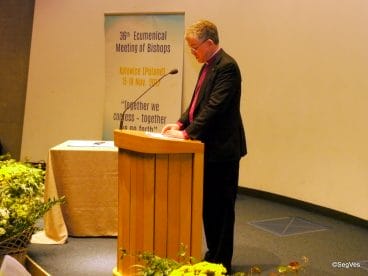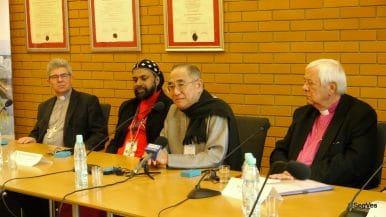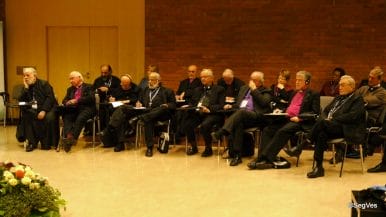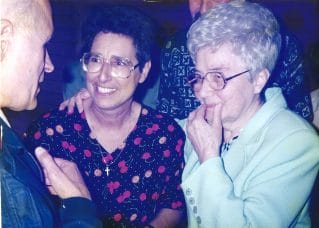
Jan 21, 2014 | Focolare Worldwide
 I grew up near to Liverpool in the North West of England. As a child I remember there used to be processions either of Catholics or of Protestants and I used to go with other children to throw stones at the Catholics! When I was 18 I started working for ecumenism which was beginning to develop among various churches in England at that time. It wasn’t easy. Many adults in the area put obstacles in the way of unity because they were afraid of opening up towards Catholics. One day I felt particularly discouraged and I challenged God: “Let me find others who are enthusiastic about unity!” The next day I went to church to a Service for young people. The preacher told us a story: “It was wartime, and everything was collapsing…” It was the story of Chiara Lubich and the beginnings of the focolare. While he was speaking my heart was burning within me! I interrupted his talk: “Where are those girls now? Did they die in the air raids?” “No,” he replied, “don’t you know? They’re here in Liverpool!” I went to see them straight away. Rather than finding three foreign girls in the focolare I would say I found the Gospel being lived. I felt as if I was being born anew and starting my life all over again. I wanted to live the Gospel, too. I wanted to give God the first place in my life. But there were many prejudices to overcome.
I grew up near to Liverpool in the North West of England. As a child I remember there used to be processions either of Catholics or of Protestants and I used to go with other children to throw stones at the Catholics! When I was 18 I started working for ecumenism which was beginning to develop among various churches in England at that time. It wasn’t easy. Many adults in the area put obstacles in the way of unity because they were afraid of opening up towards Catholics. One day I felt particularly discouraged and I challenged God: “Let me find others who are enthusiastic about unity!” The next day I went to church to a Service for young people. The preacher told us a story: “It was wartime, and everything was collapsing…” It was the story of Chiara Lubich and the beginnings of the focolare. While he was speaking my heart was burning within me! I interrupted his talk: “Where are those girls now? Did they die in the air raids?” “No,” he replied, “don’t you know? They’re here in Liverpool!” I went to see them straight away. Rather than finding three foreign girls in the focolare I would say I found the Gospel being lived. I felt as if I was being born anew and starting my life all over again. I wanted to live the Gospel, too. I wanted to give God the first place in my life. But there were many prejudices to overcome.

London, 11 November 1996: Chiara Lubich and a group of Anglican focolarini with Archbishop George Carey and Bishop Robin Smith.

Nov 27, 2017 | Focolare Worldwide
 For the first time after 36 years, Poland was the host country of the annual ecumenical convention of the Bishop-friends of the Focolare Movement. After Jerusalem, Istanbul, London, Augsburg and other “symbolic” cities of the ecumenical commitment, Katowice, capital of Slesia, an ancient city of almost 300,000 inhabitant, welcomed, from 15 to 18 November, 35 bishops of different Churches: Orthodox, Syriac-Orthodox, Evangelical-Lutherans, Anglican, Methodists and Catholics from Germany, Austria, England, Ireland, Sweden, Poland, Hungary, Lithuania, Latvia, Czech Republic, but also Brazil, Cyprus, India, Democratic Republic of Congo, Thailand and the USA. Along with around thirty lay people the bishops gathered in Katowice represented a cross section of various social and ecclesial communities, driven by the desire to make an experience of fraternal communion. “Together we confess, together we go forth” was the title of the Convention, which was organized not only by the Focolare Movement, but also by the local Catholic Archdiocese and the Evangelical-Lutheran Church of Augustinian Confession, the Orthodox Church of Sosnowiec, the Faculty of Theology of the Slesia University and the city of Katowice itself, represented by mayor Marcin Krupa.
For the first time after 36 years, Poland was the host country of the annual ecumenical convention of the Bishop-friends of the Focolare Movement. After Jerusalem, Istanbul, London, Augsburg and other “symbolic” cities of the ecumenical commitment, Katowice, capital of Slesia, an ancient city of almost 300,000 inhabitant, welcomed, from 15 to 18 November, 35 bishops of different Churches: Orthodox, Syriac-Orthodox, Evangelical-Lutherans, Anglican, Methodists and Catholics from Germany, Austria, England, Ireland, Sweden, Poland, Hungary, Lithuania, Latvia, Czech Republic, but also Brazil, Cyprus, India, Democratic Republic of Congo, Thailand and the USA. Along with around thirty lay people the bishops gathered in Katowice represented a cross section of various social and ecclesial communities, driven by the desire to make an experience of fraternal communion. “Together we confess, together we go forth” was the title of the Convention, which was organized not only by the Focolare Movement, but also by the local Catholic Archdiocese and the Evangelical-Lutheran Church of Augustinian Confession, the Orthodox Church of Sosnowiec, the Faculty of Theology of the Slesia University and the city of Katowice itself, represented by mayor Marcin Krupa.  The convention opened with the reflection of Lesley Ellison, an Anglican, on “The Spirituality of unity: an ecumenical spirituality,” and had as its central theme “Mary, the Mother of Jesus,” with the theological studies in the various Catholic, Evangelic, Anglican and Orthodox perspectives. There were many encounters, celebrations and moments of prayer according to the various traditions, sealed by a “pact of mutual love” to live fraternal communion and to “love the Church of the other as one’s own Brendan Leahly is the Catholic bishop of Limerick (Irelanda), expert and counselor of ecumenical dialogue in his country. Interviewed on the phone, he said: “I want to underline the warm welcome received in Katowice, which I had already visited in 1991, on the occasion of Chiara Lubich’s encounter with the Focolare centers of Western and Eastern Europe. It is a highly developed city, which valorizes diversity and hospitality. Just as what we experienced in these days, the hospitality of the Faculty of Theology which hosted us, but also of the Catholic, Lutheran and Orthodox Churches.” The convention was the occasion to get to know one another better, and acquire a deeper knowledge of the different ecclesial and socio-cultural realities we live in, especially in the Middle East and Eastern Europe. We realize that we cannot offer solutions for the problems of those countries (especially regarding the Middle East), but we can at least carry one another’s burdens. Feeling the suffering of others has enlarged my heart. Now I no longer feel only like an Irish bishop, I carry within also the situations and problems of the other bishops. But with a new hope. In every country there are signs of hope, and the steps taken at ecumenical level go to prove this fact. For example in the Czech Republic a process of mutual forgiveness is underway for the errors committed. Ecumenism – he continued– is a reality that started its path many years ago, and will meet ever new situations and give new testimonials. It is, after all, an experience of giving and receiving. What strikes me is the strong Catholic faith which is deeply rooted here in Poland, but also the openness to dialogue with the representatives of the other communities.”
The convention opened with the reflection of Lesley Ellison, an Anglican, on “The Spirituality of unity: an ecumenical spirituality,” and had as its central theme “Mary, the Mother of Jesus,” with the theological studies in the various Catholic, Evangelic, Anglican and Orthodox perspectives. There were many encounters, celebrations and moments of prayer according to the various traditions, sealed by a “pact of mutual love” to live fraternal communion and to “love the Church of the other as one’s own Brendan Leahly is the Catholic bishop of Limerick (Irelanda), expert and counselor of ecumenical dialogue in his country. Interviewed on the phone, he said: “I want to underline the warm welcome received in Katowice, which I had already visited in 1991, on the occasion of Chiara Lubich’s encounter with the Focolare centers of Western and Eastern Europe. It is a highly developed city, which valorizes diversity and hospitality. Just as what we experienced in these days, the hospitality of the Faculty of Theology which hosted us, but also of the Catholic, Lutheran and Orthodox Churches.” The convention was the occasion to get to know one another better, and acquire a deeper knowledge of the different ecclesial and socio-cultural realities we live in, especially in the Middle East and Eastern Europe. We realize that we cannot offer solutions for the problems of those countries (especially regarding the Middle East), but we can at least carry one another’s burdens. Feeling the suffering of others has enlarged my heart. Now I no longer feel only like an Irish bishop, I carry within also the situations and problems of the other bishops. But with a new hope. In every country there are signs of hope, and the steps taken at ecumenical level go to prove this fact. For example in the Czech Republic a process of mutual forgiveness is underway for the errors committed. Ecumenism – he continued– is a reality that started its path many years ago, and will meet ever new situations and give new testimonials. It is, after all, an experience of giving and receiving. What strikes me is the strong Catholic faith which is deeply rooted here in Poland, but also the openness to dialogue with the representatives of the other communities.”  Åke Bonnier, Lutheran bishop of the diocese of Skara, in Sweden, said he was happy about the convention: «We were not bishops but brothers. What we shared in the convention was a reality, both during the breaks and intervals, and also during the celebrations. This was very important for me, it gave me new strength and enthusiasm. I now look forward to next year, when, I hope all of them and also others can come to Sweden. If they ask me if this meeting was important as a path for the unity of Christians, my answer is yes. Unity is not something that will come about only in the future, it is already a reality among us.”
Åke Bonnier, Lutheran bishop of the diocese of Skara, in Sweden, said he was happy about the convention: «We were not bishops but brothers. What we shared in the convention was a reality, both during the breaks and intervals, and also during the celebrations. This was very important for me, it gave me new strength and enthusiasm. I now look forward to next year, when, I hope all of them and also others can come to Sweden. If they ask me if this meeting was important as a path for the unity of Christians, my answer is yes. Unity is not something that will come about only in the future, it is already a reality among us.”

Aug 25, 2020 | Non categorizzato
Chiara Lubich’s charism for Christian unity. Interview with Lesley Ellison who is an Anglican and the first non-Catholic focolarina to follow Chiara.  Living the Gospel, Word of God together; loving one’s neighbour as Jesus did, to the point of dying for the other; living for unity among believers in Christ, beyond every affiliation and beyond all divisions. It is with these dimensions that the ecumenical potential of Chiara Lubich’s charism of unity is unfolding. “A completely ecumenical spirituality” is how Card. Kurt Koch, President of the Pontifical Council for the Promotion of Christian Unity described the charism in the preface to the book entitled “A Spirituality for Christian Unity. Selected thoughts.”, published by Città Nuova, which is a collection of speeches and answers to ecumenical questions given by the founder of the Focolare Movement, one hundred years after her birth. The introduction to the book is given by Maria Voce, President of the Focolare with a foreword offered by Rev. Olav F. Tveit, former Secretary General of the Ecumenical Council of Churches, now President of the Conference of Lutheran Bishops in Norway. Lesley Ellison, an Anglican focolarina, is the first non-Catholic focolarina to follow Chiara: Your experience has paved the way for many. Did you ever have hesitations? “I grew up in a Protestant family with prejudices against Catholics, and at that time in Liverpool the two communities were separated. Like Chiara, I also wanted to give my life to God. When I first heard her speak, in Canterbury in 1967, I had been visiting the focolarine in Liverpool for a year. We tried to live the Gospel but I didn’t know they were Catholic. Just as I did not know the community of people around the focolare. It was a shock to realize they were all Catholic but in Canterbury, listening to Chiara, I understood that God loves everyone, and that “everyone” also includes Catholics! I felt I had to take a step and put aside my prejudices. When I got to Liverpool a Catholic couple offered me a lift home. This was unheard of. “But I’m Protestant,” I said. “That’s all right! We love each other!” they said. This was my first ecumenical experience.” When did you feel that the Spirituality of unity could be yours? “In 1967 I went to visit the little town of Loppiano. During the visit there was a Catholic Mass but being an Anglican I could not receive the Eucharist. This rift between our Churches seemed absurd to me, so painful that inside I cried out to Jesus: “What can I do?” And I seemed to hear Him respond, “Give me your life for unity.”” Living the Gospel is the way that Chiara indicated for unity. Why, as an Anglican, did this proposal have an impact on you? “My formation as a young Anglican asked me to “listen to, read, take note of, learn and digest inwardly” the word of God. So the idea of “living the Gospel” which I heard for the first time in the focolare, was a complete novelty and gave my Christian life a new communitarian dimension”. Jesus asks us to love one another as He did, to the point of giving our lives for one another. What does this mean for you in your relationships with people of other Churches? “It’s in the word ‘as’ that I find the whole of Chiara’s charism, Jesus crucified and forsaken who is Life. This is the way God Himself wanted to dialogue with humanity, and it is the model He offers us for any dialogue with one another and with Him. For me, giving my life means welcoming the other, listening, putting aside my thoughts and judgments. But it also means offering my thoughts whilst being completely detached from them. This is what Chiara did with me and with every person she met. And this is how we try to live the relationships with one another in the Movement.
Living the Gospel, Word of God together; loving one’s neighbour as Jesus did, to the point of dying for the other; living for unity among believers in Christ, beyond every affiliation and beyond all divisions. It is with these dimensions that the ecumenical potential of Chiara Lubich’s charism of unity is unfolding. “A completely ecumenical spirituality” is how Card. Kurt Koch, President of the Pontifical Council for the Promotion of Christian Unity described the charism in the preface to the book entitled “A Spirituality for Christian Unity. Selected thoughts.”, published by Città Nuova, which is a collection of speeches and answers to ecumenical questions given by the founder of the Focolare Movement, one hundred years after her birth. The introduction to the book is given by Maria Voce, President of the Focolare with a foreword offered by Rev. Olav F. Tveit, former Secretary General of the Ecumenical Council of Churches, now President of the Conference of Lutheran Bishops in Norway. Lesley Ellison, an Anglican focolarina, is the first non-Catholic focolarina to follow Chiara: Your experience has paved the way for many. Did you ever have hesitations? “I grew up in a Protestant family with prejudices against Catholics, and at that time in Liverpool the two communities were separated. Like Chiara, I also wanted to give my life to God. When I first heard her speak, in Canterbury in 1967, I had been visiting the focolarine in Liverpool for a year. We tried to live the Gospel but I didn’t know they were Catholic. Just as I did not know the community of people around the focolare. It was a shock to realize they were all Catholic but in Canterbury, listening to Chiara, I understood that God loves everyone, and that “everyone” also includes Catholics! I felt I had to take a step and put aside my prejudices. When I got to Liverpool a Catholic couple offered me a lift home. This was unheard of. “But I’m Protestant,” I said. “That’s all right! We love each other!” they said. This was my first ecumenical experience.” When did you feel that the Spirituality of unity could be yours? “In 1967 I went to visit the little town of Loppiano. During the visit there was a Catholic Mass but being an Anglican I could not receive the Eucharist. This rift between our Churches seemed absurd to me, so painful that inside I cried out to Jesus: “What can I do?” And I seemed to hear Him respond, “Give me your life for unity.”” Living the Gospel is the way that Chiara indicated for unity. Why, as an Anglican, did this proposal have an impact on you? “My formation as a young Anglican asked me to “listen to, read, take note of, learn and digest inwardly” the word of God. So the idea of “living the Gospel” which I heard for the first time in the focolare, was a complete novelty and gave my Christian life a new communitarian dimension”. Jesus asks us to love one another as He did, to the point of giving our lives for one another. What does this mean for you in your relationships with people of other Churches? “It’s in the word ‘as’ that I find the whole of Chiara’s charism, Jesus crucified and forsaken who is Life. This is the way God Himself wanted to dialogue with humanity, and it is the model He offers us for any dialogue with one another and with Him. For me, giving my life means welcoming the other, listening, putting aside my thoughts and judgments. But it also means offering my thoughts whilst being completely detached from them. This is what Chiara did with me and with every person she met. And this is how we try to live the relationships with one another in the Movement.
Claudia Di Lorenzi

 I grew up near to Liverpool in the North West of England. As a child I remember there used to be processions either of Catholics or of Protestants and I used to go with other children to throw stones at the Catholics! When I was 18 I started working for ecumenism which was beginning to develop among various churches in England at that time. It wasn’t easy. Many adults in the area put obstacles in the way of unity because they were afraid of opening up towards Catholics. One day I felt particularly discouraged and I challenged God: “Let me find others who are enthusiastic about unity!” The next day I went to church to a Service for young people. The preacher told us a story: “It was wartime, and everything was collapsing…” It was the story of Chiara Lubich and the beginnings of the focolare. While he was speaking my heart was burning within me! I interrupted his talk: “Where are those girls now? Did they die in the air raids?” “No,” he replied, “don’t you know? They’re here in Liverpool!” I went to see them straight away. Rather than finding three foreign girls in the focolare I would say I found the Gospel being lived. I felt as if I was being born anew and starting my life all over again. I wanted to live the Gospel, too. I wanted to give God the first place in my life. But there were many prejudices to overcome.
I grew up near to Liverpool in the North West of England. As a child I remember there used to be processions either of Catholics or of Protestants and I used to go with other children to throw stones at the Catholics! When I was 18 I started working for ecumenism which was beginning to develop among various churches in England at that time. It wasn’t easy. Many adults in the area put obstacles in the way of unity because they were afraid of opening up towards Catholics. One day I felt particularly discouraged and I challenged God: “Let me find others who are enthusiastic about unity!” The next day I went to church to a Service for young people. The preacher told us a story: “It was wartime, and everything was collapsing…” It was the story of Chiara Lubich and the beginnings of the focolare. While he was speaking my heart was burning within me! I interrupted his talk: “Where are those girls now? Did they die in the air raids?” “No,” he replied, “don’t you know? They’re here in Liverpool!” I went to see them straight away. Rather than finding three foreign girls in the focolare I would say I found the Gospel being lived. I felt as if I was being born anew and starting my life all over again. I wanted to live the Gospel, too. I wanted to give God the first place in my life. But there were many prejudices to overcome. 




